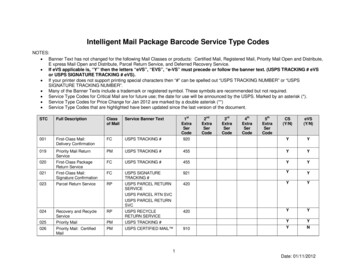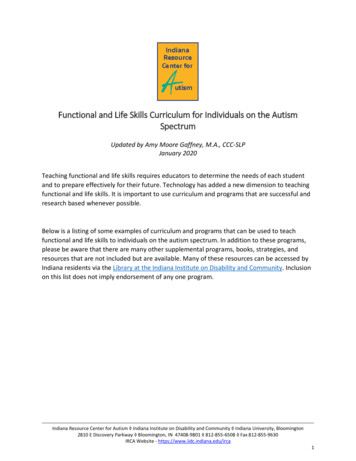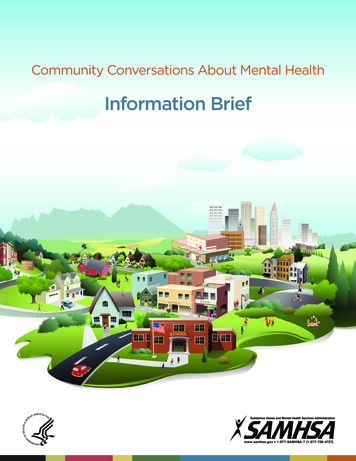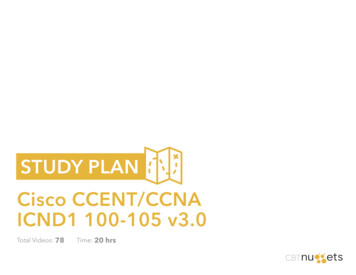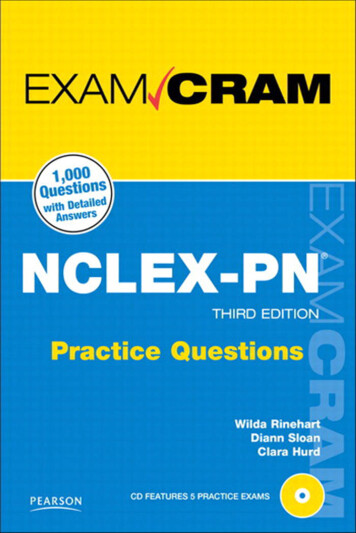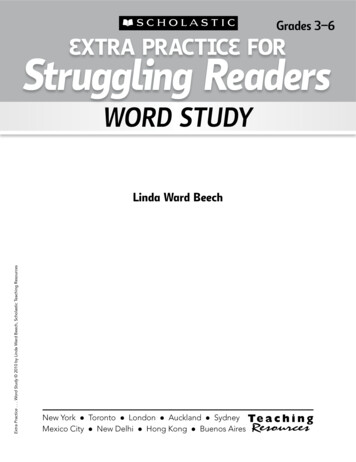
Transcription
Grades 3–6Extra Practice forStruggling ReadersWORD STUDYExtra Practice . . . Word Study 2010 by Linda Ward Beech, Scholastic Teaching ResourcesLinda Ward BeechNew York Toronto London Auckland SydneyMexico City New Delhi Hong Kong Buenos Aires
Editor: Mela OttaianoCover design: Brian LaRossaInterior design: Melinda BelterInterior illustrations: Teresa AnderkoISBN-13: 978-0-545-12411-9ISBN-10: 0-545-12411-5Copyright 2010 by Linda Ward BeechAll rights reserved. Published by Scholastic Inc.Printed in the U.S.A.1 2 3 4 5 6 7 8 9 104016 15 14 13 12 11 10Extra Practice . . . Word Study 2010 by Linda Ward Beech, Scholastic Teaching ResourcesScholastic Inc. grants teachers permission to photocopy the designated reproducible pages from this bookfor classroom use. No other part of this publication may be reproduced in whole or in part, or stored in aretrieval system, or transmitted in any form or by any means, electronic, mechanical, photocopying, recording,or otherwise, without written permission of the publisher. For information regarding permission, write toScholastic Inc., 557 Broadway, New York, NY 10012.
ContentsExtra Practice . . . Word Study 2010 by Linda Ward Beech, Scholastic Teaching ResourcesIntroduction . . . . . . . . . . . . . . . . . . . . . . . . . . . . . . . . . . . . . . . . . . . . . . . . . . . . . . . . . . . . . . . . . . . . . . 4Lesson 1:Compound Words . . . . . . . . . . . . . . . . . . . . . . . . . . . . . . . . . . . . . . . . . . . . . . . . . . . . . . 6Lesson 2:More Compound Words . . . . . . . . . . . . . . . . . . . . . . . . . . . . . . . . . . . . . . . . . . . . . . . . . 9Lesson 3:Prefixes: un-, re-, over-, mis-, sub- . . . . . . . . . . . . . . . . . . . . . . . . . . . . . . . . . . . . . . 12Lesson 4:Prefixes: in-, fore-, de-, dis-, under- . . . . . . . . . . . . . . . . . . . . . . . . . . . . . . . . . . . . . 15Lesson 5:Prefixes: super-, pre-, semi-, multi-, im- . . . . . . . . . . . . . . . . . . . . . . . . . . . . . . . . 18Lesson 6:Suffixes: -er/or, -ful, -ly, -ness, -able/ible . . . . . . . . . . . . . . . . . . . . . . . . . . . . . . . . 21Lesson 7:Suffixes: -ship, -ment, -less, -y, -ist . . . . . . . . . . . . . . . . . . . . . . . . . . . . . . . . . . . . . . 24Lesson 8:Suffixes: -ant/ent, -al, -ous, -ion/tion, -hood . . . . . . . . . . . . . . . . . . . . . . . . . . . . . 27Lesson 9:Prefixes and Suffixes . . . . . . . . . . . . . . . . . . . . . . . . . . . . . . . . . . . . . . . . . . . . . . . . . . 30Lesson 10:Latin Roots: ped, numer, act, port, art . . . . . . . . . . . . . . . . . . . . . . . . . . . . . . . . . . 33Lesson 11:Latin Roots: pop, form, ject, nav, man . . . . . . . . . . . . . . . . . . . . . . . . . . . . . . . . . . 36Lesson 12:Latin Roots: vis/vid, dict, aud, liber, mar . . . . . . . . . . . . . . . . . . . . . . . . . . . . . . . 39Lesson 13:Greek Roots: phon, meter, geo . . . . . . . . . . . . . . . . . . . . . . . . . . . . . . . . . . . . . . . . . 42Lesson 14:Greek Roots: photo, auto, bio . . . . . . . . . . . . . . . . . . . . . . . . . . . . . . . . . . . . . . . . . . 45Lesson 15:Greek Roots: graph, tele, cycle . . . . . . . . . . . . . . . . . . . . . . . . . . . . . . . . . . . . . . . . . 48Lesson 16:Greek and Latin Number Roots . . . . . . . . . . . . . . . . . . . . . . . . . . . . . . . . . . . . . . . . 51Lesson 17:Plurals . . . . . . . . . . . . . . . . . . . . . . . . . . . . . . . . . . . . . . . . . . . . . . . . . . . . . . . . . . . . . . . 54Lesson 18:More Plurals . . . . . . . . . . . . . . . . . . . . . . . . . . . . . . . . . . . . . . . . . . . . . . . . . . . . . . . . . . 57Lesson 19:Plurals and Possessives . . . . . . . . . . . . . . . . . . . . . . . . . . . . . . . . . . . . . . . . . . . . . . . 60Lesson 20:Word Endings . . . . . . . . . . . . . . . . . . . . . . . . . . . . . . . . . . . . . . . . . . . . . . . . . . . . . . . . . 63Lesson 21:Contractions . . . . . . . . . . . . . . . . . . . . . . . . . . . . . . . . . . . . . . . . . . . . . . . . . . . . . . . . . . 66Lesson 22:Easily Confused Words . . . . . . . . . . . . . . . . . . . . . . . . . . . . . . . . . . . . . . . . . . . . . . . . 69Lesson 23:Syllables . . . . . . . . . . . . . . . . . . . . . . . . . . . . . . . . . . . . . . . . . . . . . . . . . . . . . . . . . . . . . 72Lesson 24:More Syllables . . . . . . . . . . . . . . . . . . . . . . . . . . . . . . . . . . . . . . . . . . . . . . . . . . . . . . . . 75Answers. . . . . . . . . . . . . . . . . . . . . . . . . . . . . . . . . . . . . . . . . . . . . . . . . . . . . . . . . . . . . . . . . . . . . . . 78
IntroductionLearning to read is the goal for all students, but, unfortunately, success is not a given. Manystudents, for many reasons, find reading an enormous challenge. Despite excellent readingprograms, dedicated teachers, and various kinds of interventions, all too many students emergefrom the primary grades as struggling readers. One way in which to help these students is withadditional practice in word study.Understanding the structure of words provides useful information to readers when theyare figuring out meaning and pronunciation. Elements such as prefixes, suffixes, and roots areinvaluable when encountering new words. According to one study, approximately 60 percentof English words have definitions that can be predicted based on the meanings of theirparts. Breaking words down into syllables, smaller words, or other word parts helps studentsrecognize common spelling patterns. These skills also support word recognition and vocabularydevelopment. Struggling readers gain confidence as they apply these skills.By offering opportunities to learn or review basic word study techniques, the lessons inthis book help students develop and reinforce reading fluency. You can use the lessons in thesequence given or choose those needed to address specific weaknesses in a student’s skills.Lesson OrganizationCVbZ 9ViZ Each lesson is three pages long andaddresses a particular element ofword study.The first lesson page includes:LdgY HijYn AZhhdc &( Greek Roots: phon, meter, geoMany words in English come from Greek. If you know the meaning of Greekroots, it will help you understand more words when you read.A a statement of the word studyelement for the ermometergeoearthgeographyStudy the chart above. Then use it to complete each sentence.You may use a word more than once.1. A measures temperature.2. The study of earth’s surface is called .3. In reading, you learn about , the sounds that letters spell.4. To find out how warm it is, check a .5. You learn about earth’s plains, hills, and mountains in .BChoose a word from the box to complete each ephone1. Someone who studies earth’s crust is a .2. A measures the speed of a car.3. He used to listen to music.4. A measures or marks time for a musician.5. You can talk to a friend on the . another exerciseCVbZ 9ViZ LdgY HijYn AZhhdc &( )'Greek Roots: phon, meter, geoThe second page includes:C t wo other exercises including cloze exercises, wordmeaning, identification of word parts, word building,syllables, word endingsExtra Practice . . . Word Study 2010 by Linda Ward Beech, Scholastic Teaching ResourcesD4Greek mometergeoearthgeographyUnderline the Greek root in each word below. Then write a meaning for each word.Use the chart above and a dictionary to help you.1. geode2. odometer3. megaphone4. perimeter5. geologyUnderline the Greek root in each word. Then circle the best meaning for the word.1. microphonea. instrument to makesound louderb. film for makingsmall photosc. a kind of germ2. pedometera. someone whotakes care of feetb. instrument to measurewalking distancec. a triangular partof a building3. geocentrica. very largeb. related to exercisec. viewed fromearth’s center4. symphonya. place of worshipb. music for anorchestrac. a samenessof feeling5. barometera. something left overb. instrument to measureair pressurec. having to dowith the eye)(Extra Practice . . . Word Study 2010 by Linda Ward Beech, Scholastic Teaching Resources a simple activity reinforcing theelementExtra Practice . . . Word Study 2010 by Linda Ward Beech, Scholastic Teaching Resources examples of the word study elementGreek Root
CVbZ 9ViZ LdgY HijYn AZhhdc &( The third page includes:Greek Roots: phon, meter, geo a word meaning exercise a comprehension passage that reviews thelesson element and includes questions; or aword puzzleEGreek mometergeoearthgeographySome math words have the Greek root meter. Add this root to each word on the web.Then write the meaning of each word. Use the chart above and a dictionary to help you.1. centi3. diaMETER2. kiloF4. milliRead the passage. Circle the words with the Greek roots from this lesson.Thenanswer the questions.make too much noise when we do our geometry and geography lessons.Of course, we think he makes too much noise when he is on his cellphone. He paces the perimeter of the room and talks in a loud voice. You’dthink he had a megaphone!1. What is a phonometer?2. Why does the big brother want one?3. How do you think this family should solve this problem?Ways to Make the Mostof the Lessons))Extra Practice . . . Word Study 2010 by Linda Ward Beech, Scholastic Teaching ResourcesDo you know what a phonometer is? My big brother says he needs one.He wants to measure the sound when we do our homework. He thinks we U se the lessons in the classroom for extra practice during regular reading time or asindividual assignments. Send the lessons home for students to do as homework or tocomplete with an adult. R eview, review, review. For example, when students are working on a lesson about prefixes,they will also encounter various vowel and consonant sounds. Take a minute to remindstudents about what they already know about those sounds. Discuss students’ answers to clear up misconceptions and to reinforce the lesson element. U se the lessons to draw attention to spelling changes for verb tenses or plurals and for partsof speech.Extra Practice . . . Word Study 2010 by Linda Ward Beech, Scholastic Teaching Resources H ave students create word webs to illustrate the use of suffixes, Latin or Greek roots, commonsyllables, or other word study elements. U se the lessons to expand students’ vocabulary. Help students use the skills covered in thebook to break down the multisyllabic words in the lessons. C reate word lists from each lesson. Students can use them in word sorts, on word walls, inwriting assignments, or in readers’ journals. E ncourage students to write complete sentences when they answer the questions for thecomprehension paragraphs in Exercise F. Keep observation charts to monitor progress.5
Name DateWord Study Lesson 1Compound WordsSome words are made up of two words put together. They are called compoundwords. When you read, look for the words that make up a compound word.A Write the two words that make up each of the compound words in the box.Then write the compound tpopcornsnowflaketoolboxwheelchair1. 2. 3. 4. 5. 6. 7. 9. 10. B Add the word on the left to each of the words in the row to make compound words.61. bedroomtimespread2. snowsuitstormplow3. footprintpathstool4. eyelidsightballExtra Practice . . . Word Study 2010 by Linda Ward Beech, Scholastic Teaching Resources8.
Name DateWord Study Lesson 1CAdd the correct word from the box to each group of words to make compound words.boatbookdayhouse1. cook note pocket Extra Practice . . . Word Study 2010 by Linda Ward Beech, Scholastic Teaching Resources2. greenD bird light 3. some every birth 4. tug sail motor Write a compound word to complete each sentence.1. A case for books is a .2. A pot for a flower is a .3. A box for mail is a .4. A house for a dog is a .5. A boat that you row is a .6. A paper with news is a .7
Name DateWord Study Lesson 1EWrite a compound word for each riddle.Example: Did you ever see a star fish?Fstarfish1. Did you ever see a horse fly?2. Did you ever see a match box?3. Did you ever see a cat fish?4. Did you ever see the sun rise?5. Did you ever see the sea weed?6. Did you ever see a day dream?7. Did you ever see hair cut?8. Did you ever see a door step?9. Did you ever see a bed roll?10. Did you ever see milk shake?Read the paragraph and circle the compound words. Then answer the questions.beachball takes up a lot of space, but her baseball does not. Her footballand basketball are also in the box. Where is her skateboard? It’s on thefloor next to her snowboard.1. Why does Margo have so many balls?2. Where does she keep them?3. What other sports does Margo like?8Extra Practice . . . Word Study 2010 by Linda Ward Beech, Scholastic Teaching ResourcesMargo likes sports. She keeps her balls in a box in the hallway. Her
Name DateWord Study Lesson 2More Compound WordsSome words are made up of two words put together. They are called compoundwords. When you read, look for the words that make up a compound word.AExtra Practice . . . Word Study 2010 by Linda Ward Beech, Scholastic Teaching ResourcesBWrite the two words that make up each compound word.1. footnote 2. pipeline 3. barbell 4. grasshopper 5. playpen 6. lawmaker 7. homeowner 8. groundwork Write a compound word to complete each sentence.1. A sleeve for a shirt is a .2. A skin from a bear is a .3. Paper for a wall is .4. A robe for the bath is a .5. A groom for a bride is a .6. A chair with an arm is an .7. The side of a hill is a .8. A base for data is a .9
Name DateWord Study Lesson 2CDWrite a compound word for each riddle.1. Did you ever see a book shop?2. Did you ever see a bean stalk?3. Did you ever see honey comb?4. Did you ever see a heart break?5. Did you ever see art work?6. Did you ever see a bill fold?Read each question. Then circle the best answer.a. bluefishb. blueberryc. bluebird2. Which one can you wear?a. raincoatb. raindropc. rainstorm3. Which one is an insect?a. houseworkb. householdc. housefly4. Which one describes hair?a. redcapb. redbirdc. redhead5. Which one is a machine?a. dishwaterb. dishtowelc. dishwasher6. Which one do you eat?a. eggheadb. eggplantc. eggshell7. Which one is a plant?a. catcallb. catnipc. catfish8. Which one is part of you?a. windmillb. windpipec. windsock9. Which one is news?a. headdressb. headboardc. headlinea. landmarkb. landlordc. landscape10. Which one is a person?10Extra Practice . . . Word Study 2010 by Linda Ward Beech, Scholastic Teaching Resources1. Which one can fly?
Name DateWord Study Lesson 2EThink of a word for each picture, then write a compound word.1. mark 2. top 3.sand 4.bare 5.gold Extra Practice . . . Word Study 2010 by Linda Ward Beech, Scholastic Teaching Resources6.F burn 7.snow 8.copy 9. place 10. sauce Read the paragraph and circle the compound words. Then answer the questions.Kirk got out a teaspoon, tablespoon, pan, potholder, and everything elsehe needed. He opened the cookbook to find the cake he wanted to make.Then he went to work. There was only one setback when he spilled somebatter. When the cake was done, Kirk called his mother to the kitchen.“Happy Birthday!” he said. “Here’s a homemade cake for you.”1. Why did Kirk want to bake a cake?2. How well did the baking go?3. Was the cake a surprise? Explain your answer.11
Name DateWord Study Lesson 3Prefixes: un-, re-, over-, mis-, subA prefix is a word part that is added to the beginning of a word. A prefixchanges the meaning of a word. Look for prefixes to help you understandwhat words mean.APrefixMeaningExampleun-not; opposite ofunfairre-againredoover-too muchovercookmis-in a wrong way; wronglymistreatsub-undersubwayStudy the chart above. Then use it to complete each sentence.1. If you cook food too much, you it.2. If you do something over, you it.3. If something is not fair, it is .4. A travels under the ground.5. If you treat someone wrongly, you that person.12Underline the prefix in each word. Then write the base word without the prefix.1. unfold7. misstep2. misuse8. unsure3. unsafe9. subplot4. repack10. overeat5. submarine11. retie6. overripe12. rewriteExtra Practice . . . Word Study 2010 by Linda Ward Beech, Scholastic Teaching ResourcesB
Name DateWord Study Lesson 3Prefixes: un-, re-, over-, mis-, subPrefixMeaningExampleun-not; opposite ofunfairre-againredoover-too muchovercookmis-in a wrong way; wronglymistreatsub-undersubwayC Write a heading that tells how each group of words is alike. Then write a meaning foreach word.1.3.overdo unrealovertip unhappyoverbake unkind2.4.Extra Practice . . . Word Study 2010 by Linda Ward Beech, Scholastic Teaching Resourcesreheat misnamerefill misleadretell misnumberD Read each meaning below. Add a prefix to each word in bold type to make a new word.MeaningPrefix Word New Word1. to call again2. the opposite of even3. to flow too much4. under the soil5. read in a wrong way13
Name DateWord Study Lesson 3Prefixes: un-, re-, over-, mis-, sub-EMeaningExampleun-not; opposite ofunfairre-againredoover-too muchovercookmis-in a wrong way; wronglymistreatsub-undersubwayRead each question. Then circle the best answer.1. W hich word means toplace wrongly?a. replaceb. misplacec. placed2. W hich word means theopposite of loved?a. unlovedb. lovelyc. lover3. W hich word means paytoo much?a. underpayb. repayc. overpay4. W hich word means touse again?a. reuseb. usedc. overuse5. W hich word means a headingunder another heading?a. headerb. headedc. subheadRead the paragraphs and circle the words with prefixes. Then answer the questions.Alice tried to enter the room unseen. She was late becauseshe had overslept. But she had misjudged Mr. Hunt.“What does the subtitle of this chapter mean?” he asked heras she took her seat.“I’m unsure of what page we’re on,” said Alice. “Could yourestate it for me?”1. Where does this story take place?2. How did Mr. Hunt show that he wasn’t fooled?3. Why doesn’t Alice know the answer?14Extra Practice . . . Word Study 2010 by Linda Ward Beech, Scholastic Teaching ResourcesFPrefix
Name DateWord Study Lesson 4Prefixes: in-, fore-, de-, dis-, underA prefix is a word part that is added to the beginning of a word. A prefix changes themeaning of a word. Look for prefixes to help you understand what words eforewarnde-away; take awaydefrostdis-not; oppositedisobeyunder-below; too littleunderpayStudy the chart above. Then use it to complete each sentence.1. If an event is not formal, it is .2. If you do not obey, you .3. If you pay too little, you .4. If you take away frost from a window, you it.Extra Practice . . . Word Study 2010 by Linda Ward Beech, Scholastic Teaching Resources5. If you warn someone before something happens, you that person.BUnderline the prefix in each word. Then write a meaning for the word.1. indirect2. decontrol3. dislike4. underage5. foretell6. dishonest7. foreground8. dethrone9. underdress15
Name DateWord Study Lesson 4Prefixes: in-, fore-, de-, dis-, reforewarnde-away; take awaydefrostdis-not; oppositedisobeyunder-below; too littleunderpayRead each question. Circle the best answer.a. reforestb. deforestc. forester2. W hich word meansbelow water?a. underwaterb. waterfallc. watering3. W hich word meansnot complete?a. completelyb. completedc. incomplete4. W hich word means tonot agree?a. agreementb. agreeablec. disagreeb. forefatherc. fatherly5. Which word means a family memberwho lived long before you?a. father-in-lawD Read each meaning below. Add a prefix to each word in bold type to make a new word.Meaning1. not correct2. to take away fog3. charge too little4. opposite of please5. s ee what mighthappen before it does16Prefix Word New WordExtra Practice . . . Word Study 2010 by Linda Ward Beech, Scholastic Teaching Resources1. W hich word means to takeaway a forest?
Name DateWord Study Lesson 4Prefixes: in-, fore-, de-, dis-, under-EExtra Practice . . . Word Study 2010 by Linda Ward Beech, Scholastic Teaching eforeforewarnde-away; take awaydefrostdis-not; oppositedisobeyunder-below; too littleunderpayRead each question. Then circle the best answer.1. Which one means “resting”?a. activeb. proactivec. inactive2. Which one is a mess?a. orderb. disorderc. reorder3. Which one comes first?a. forenameb. surnamec. rename4. Which one is too small?a. undersizeb. oversizec. supersize5. Which balloon has no air?a. inflatedb. deflatedc. relatedRead the paragraphs and circle the words with prefixes. Then answer the questions.Our trouble began at forenoon. Crunch! Our boat got stuckin some thick weeds. You could hear them scrape the underbody.Suddenly, we were disabled.“This is insane!” said Dad. “This means we have to discontinueour ride.We’ll disembark and swim to shore.”“Okay,” said Mom, “but first and foremost, put on yourlife jackets!”1. What happened to the boat?2. How did Dad feel about it?3. Who had safety in mind?17
Name DateWord Study Lesson 5Prefixes: super-, pre-, semi-, multi-, imA prefix is a word part that is added to the beginning of a word. A prefix changes themeaning of a word. Look for prefixes to help you understand what words mean.APrefixMeaningExamplesuper-of greater degree, size, or irclemulti-manymultilayeredim-notimproperStudy the chart above. Then use it to complete each sentence.1. If something has many layers, it is .2. If you view something beforehand, you it.3. If your behavior is not proper, it is .4. If someone is greater than the usual star, that person is a .5. If you draw half a circle, you draw a .Use the clues below the writing lines to help you.1. The stone in that ring is .half2. That water is so don’t drink it.notsupermarketpregame3. He works for a company.many4. We often shop at the .greater size5. She likes to watch the show.before18impuresemipreciousmultinationalExtra Practice . . . Word Study 2010 by Linda Ward Beech, Scholastic Teaching ResourcesB Choose a word from the box to complete each sentence.
Name DateWord Study Lesson 5Prefixes: super-, pre-, semi-, multi-, imPrefixMeaningExamplesuper-of greater degree, size, or irclemulti-manymultilayeredim-notimproperC Read each meaning below. Add a prefix to each word in bold type to make a new word.MeaningPrefix Word New Word1. not perfect2. greater than usual man3. to judge before4. half a colonExtra Practice . . . Word Study 2010 by Linda Ward Beech, Scholastic Teaching Resources5. many coloredDRead the words in the box, then follow the ientsupernaturalrejoinsemimonthlyprearrange1. Write the words with the prefix that means “not.”2. Write the words with the prefix that means “half.”3. Write the words with the prefix that means “of greater degree, size, or importance.”19
Name DateWord Study Lesson 5Prefixes: super-, pre-, semi-, multi-, im-EFPrefixMeaningExamplesuper-of greater degree, size, or irclemulti-manymultilayeredim-notimproperRead each question. Then circle the best answer.1. Which one comes first?a. undercookb. precookc. overcook2. Which one is not moving?a. immobileb. mobilec. mobility3. Which one is biggest?a. pathb. roadc. superhighway4. Which one is partly alert?a. semiconsciousb. consciousc. unconscious5. Which one describes a crayon set?a. multicoloredb. colorlessc. colorblindRead the clues, then complete the puzzle.SU2. Of many cultures3. Not patientP4. Half sweetE5. Date beforeR6. Greater than most women7. Not polite8. Heat before eating9. Many mediaWORD10. A school for children beforethey start regular school20SExtra Practice . . . Word Study 2010 by Linda Ward Beech, Scholastic Teaching Resources1. A half circle
Name DateWord Study Lesson 6Suffixes: -er/or, -ful, -ly, -ness, -able/ibleA suffix is a word part that is added to the end of a word. A suffix changes themeaning of a word. Look for suffixes to help you understand what words mean.SuffixMeaningExample-er/ora person who acts aswriter-fulfull ofjoyful-lyin that waysadly-nessstate of beingrudeness-able/iblecan be donewashableA Study the chart above. Then use it to completeeach sentence.1. Someone who writes is a .2. If you speak in a sad way, you speak .3. If something can be washed, it is .4. Someone who is rude shows .Extra Practice . . . Word Study 2010 by Linda Ward Beech, Scholastic Teaching Resources5. If you are full of joy, you are .BUnderline the suffix in each word. Then write the base word without the suffix.1. graceful7. director2. fondly8. weakly3. teacher9. skillful4. comfortable10. darkness5. painful11. leader6. fairness12. sweetly21
Name DateWord Study Lesson 6Suffixes: -er/or, -ful, -ly, -ness, -able/ibleSuffixMeaningExample-er/ora person who acts aswriter-fulfull ofjoyful-lyin that waysadly-nessstate of beingrudeness-ablecan be donewashableC Write a heading telling how each group of words is alike. Then write a meaning foreach atable2.4.bankerneatlybuilderquietlyclimberD Choose a word fr
a comprehension passage that reviews the lesson element and includes questions; or a word puzzle Ways to Make the Most of the Lessons Use the lessons in the classroom for extra practice during regular reading time or as individual assignments. Send the lessons home for



